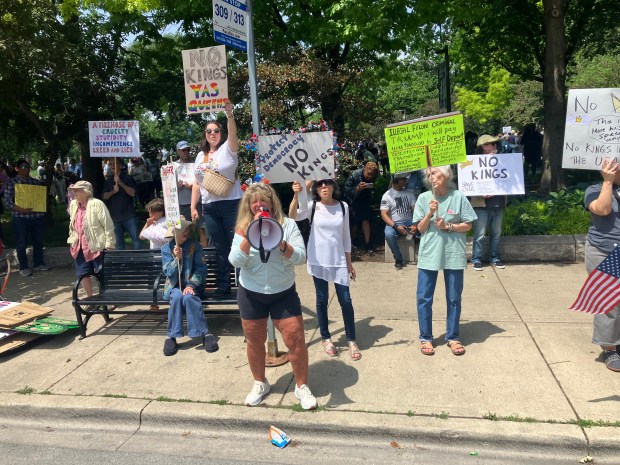While Illinois residents would get a break on grocery bills under Gov. J.B. Pritzker’s proposed budget, his tweak to the state income tax exemption could end up costing them on April 15 next year.
Pritzker’s proposal would lower a built-in annual increase to the standard state income tax exemption. The exemption is intended to rise each year in step with inflation, though the state paused that increase last year amid soaring inflation.
The resulting cost to taxpayers would be relatively small. But the effect would be more pronounced for families with lower incomes because the exemption is the same regardless of income. Some experts said that represents a departure from the governor’s commitment to more progressive taxes.
“That creates more of a challenge for low-income families than it does for affluent families, right? Because the deduction is more meaningful, the less income you earn,” Ralph Martire, executive director of the left-leaning Center for Tax and Budget Accountability.
Martire, who has praised Pritzker’s handling of state finances, suggested the change to the exemption was an acknowledgement that “some accommodations can’t be purely ideological, because our fiscal system is a challenging one.”
The income tax change went unmentioned in Pritzker’s budget address last week. He did tout his proposal to eliminate of the state’s 1% grocery tax, which he said could save families “a few hundred bucks” over the course of a year, and also made note of a proposed child tax credit for low and moderate income families.
Most of the roughly $900 million in tax increases the governor proposed would fall on corporations, including sportsbooks. In addition to a change on how corporations could write-off losses, the tax on sports wagers, paid by sportsbooks out of their post-payout revenue, would go up to 35% from 15%, raising an estimated $200 million.
Pritzker’s proposed change to the standard state income tax exemption exemption would bring in $93 million in revenue to the state, according to the governor’s office. The exemption is an amount residents can deduct from their taxable income, so a higher exemption results in savings on state income tax.
Pritzker is proposing a standard exemption of $2,550 for 2024, according to materials from the governor’s office. As it stands, the exemption for 2024 tax returns is $2,775.
Last year’s exemption on taxes due this spring was $2,425, the same as in 2022. The one-year pause put an extra $114 million in the state’s coffers, WBEZ first reported earlier this year. The increase was set to resume to its inflation-adjusted amount this year.
David Merriman, a public policy professor at the University of Illinois at Chicago and an expert on state finances, questioned the decision to raise revenue by adjusting the exemption. “It’s not that much money to taxpayers, but it’s also not that much money to the state,” Merriman said.
Republicans in Springfield this week jumped on the change as essentially amounting to a hidden tax hike for individuals.
Senate Republican Leader John Curran of Downers Grove in an interview Wednesday said the proposal was “the wrong path,” while Republican budgeteer Sen. Chapin Rose of Mahomet equated it to “basically short-sheeting your deduction.”
Pritzker’s office noted that the exemption he’s pitching remains higher than last year’s break.
“But if Republicans have additional ideas for reductions in spending or revenue ideas we welcome them,” spokesperson Jordan Abudayyeh said in an email Wednesday.
Pritzker chose to focus the potential for greater savings to residents from his proposal to eliminate the grocery tax.
“It’s one more regressive tax that we just don’t need … even if it only puts a few hundred bucks back in families’ pockets, it’s the right thing to do,” Pritzker said Wednesday to some of the loudest bipartisan applause of his entire budget address.
Getting rid of the grocery tax could drive more purchases into Illinois for people living near the border with other states, said Arwi Kriz, a researcher at the University of Illinois at Springfield who has studied food taxes. (Missouri taxes groceries, but Wisconsin, Indiana, Iowa and Kentucky generally do not.)
Legislators as ideologically distant from the governor as the far-right Freedom Caucus of state legislators offered support for eliminating the grocery tax. However the Illinois Municipal League is calling foul on the proposal, saying it would cost local governments some $325 million per year.
When the state temporarily suspended the tax during the pandemic, it reimbursed local governments for lost revenue. The governor’s current proposal offers no reimbursement.
Brad Cole, head of the Illinois Municipal League, argued that could eventually mean taxpayers will need to pay more in local taxes.
“Who does the governor think is ultimately going to pay for this? If the state reduces this tax, others have to be increased locally to make up for it,” Cole said. “The same people will have to pay it. It’s just one person gets to take the credit for the reduction, while others get blamed for the increase.”
Pritzker’s proposal for a child tax credit could also eventually get bipartisan support. The governor called for relief to low- and moderate-income people with children under 3 who receive the Earned Income Tax Credit. The child tax credit would be 20% of the EITC, the governor’s office said.
“You can say that’s a shared priority: it’s about tax relief,” House Republican Leader Tony McCombie of Savanna said in a statement.
Last week’s budget address kicks off months of negotiations on the budget in the legislature before the Assembly adjourns in late May.
Pritzker’s fellow Democrats offered measured support for the governor’s tax proposals, with Rep. Jehan Gordon-Booth of Peoria, the House Democrats’ top budget negotiator, characterizing his pitch as a “first step in the budgetmaking process.”
oolander@chicagotribune.com




